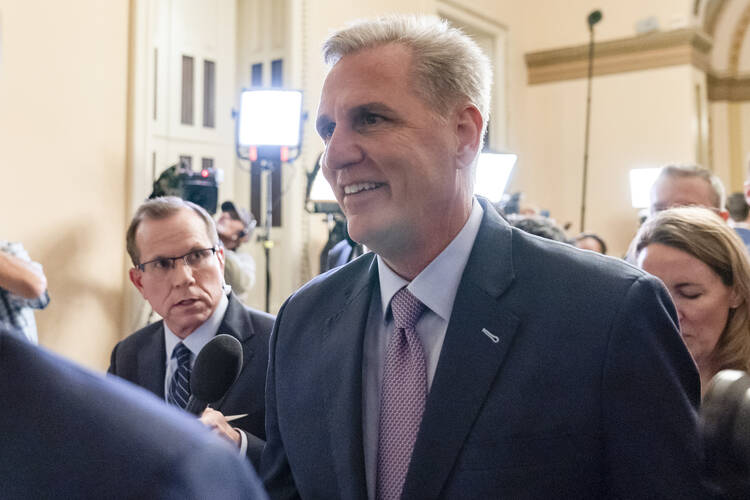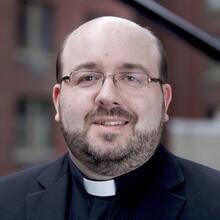What is perhaps saddest about Kevin McCarthy’s ouster as speaker of the House on Oct. 3 is that it came about in response to a brief glimmer of bipartisan consensus. For a few hours, the Congress acted for the common good of the United States, rather than for maximum partisan leverage. Its inability to do so consistently, however, is an even deeper problem than the political chaos that has temporarily vacated the speaker’s chair.
After weeks wasted on bills that could only barely, or not even, pass under the Republican House majority and would never have passed in the Senate, Mr. McCarthy finally put forward a continuing resolution to keep the government open through mid-November. It passed the House by an overwhelming majority, with more than half the Republicans and all but one Democrat voting for it. It passed the Senate even more resoundingly, with only nine Republicans voting against it.
So the good news—and it is good news—is that even with the dysfunction within the House majority, easily more than three-quarters of our legislators are committed to keeping the government open and running.
From outside Congress, it is like watching a game of chicken being played with the government and economy.
The bad news is that such consensus can be acted on only under the most extreme conditions, when the United States is days away from default on its sovereign debt or hours away from shutting down the federal government. From outside Congress, it is like watching a game of chicken being played with the government and economy. Each time this happens, the disaster is usually going to be averted and the question is mostly who flinches first, but the risk of tragedy if someone’s timing is off is entirely out of proportion to any possible reward.
Ordinarily, this problem is explained in terms of the very slim House majority, which can afford only four members voting against the rest of the G.O.P. on party-line bills (or the election of a speaker). The most politically conservative members of the Republican caucus could probably have used their leverage to extract some focused set of policy concessions, on border security or some funding cuts or even on reduced support for Ukraine, an outcome temporarily and almost accidentally achieved under the present continuing resolution.
Mr. McCarthy deserves some credit for finally placing duty above personal ambition.
But instead, as a condition of electing Mr. McCarthy in the first place, they essentially demanded a veto—maybe we can call it not a “heckler’s veto” but a “chaos veto”—over any action of the speaker or indeed, the rest of the Republican majority. But that veto had a massive loophole. It was always going to be possible, if the speaker was willing to risk his chair, to end-run this veto by the process of bipartisan compromise. And Kevin McCarthy did so twice, to avoid default on the debt at the end of May and then again to avoid a government shutdown at the end of September. Even acknowledging his failures in reneging on the funding deal he made as part of the debt negotiations and running out the clock while trying to avoid recourse to bipartisanship on the continuing resolution, Mr. McCarthy deserves some credit for finally placing duty above personal ambition.
Now that he has said that he will not seek the speaker’s chair again, the country waits to see who the Republicans in the House will put forward, and whether the next speaker will be hobbled by the same “chaos veto” concession extracted from Mr. McCarthy.
But there is a deeper problem than just what rules will govern the House under the next speaker: the question of what a government is for, and how it is to function beyond matters that a bare majority can vote through. In “Gaudium et Spes,” the Second Vatican Council’s document on the church in the modern world, the council explained that any political community exists “for the sake of the common good, in which it finds its full justification and significance, and the source of its inherent legitimacy” (No. 74).
Both legislators and voters are called to aim for something more important than whatever they can win for the short run.
This may seem impossibly idealistic, but it is not inherently dissimilar to the idealism of the founding documents of the American republic. Both legislators and voters are called to aim for something more important than whatever they can win for the short run.
It is sadly likely that the next speaker will be operating under constraints very similar to those that bound Mr. McCarthy. But we should also remember that far more than half the country does not want the government shutdown; far more than half the country recognizes the need for immigration reform that does more than simply securing the border; far more than half the country thinks the government needs to do more to address climate change.
Our inability to agree to do things we mostly agree need to be done is not just a temporary symptom of a dysfunctional partisan majority. It reveals a deeper problem of viewing political compromise as a grudging surrender to avoid crisis rather than an achievement for the sake of the common good. We can hope for something better; we should vote for it too.








